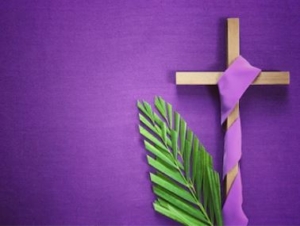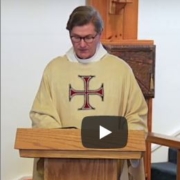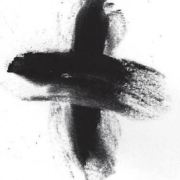My wife and I, while entertaining an out of town guest last month, went to the South Florida Fair for the first time in many years. What a difference a few weeks makes, though. It looks rather bleak now that the carnival rides, games and concession stands are gone. Timely, I suppose, since Lent is now upon us. In some European countries an effigy of the Carnival is actually dressed up on Shrove Tuesday only to be “condemned to death” and burnt. A corresponding episode is the driving out or “killing” of ‘death.”

The ritual is symbolic of the end of winter and the renewal of spring and the regeneration of nature, but for those of us who live year round in South Florida the change of season is not so dramatic. This makes it even more important that we observe the change in the liturgical “mode.” For example, we “bury” the Alleluia during the season of Lent; it’s not heard again in our worship until the Great Vigil of Easter on Saturday evening, April 11th.
For us today, this practice may seem somewhat extreme, but I’m reminded of what the mother superior of one of our religious orders told me years ago: “When we fast, we fast; and when we feast, we feast!” Lent is the time to fast; not merely to “lose weight” or to make some feeble attempt to identify with the poor; as if that were possible. Rather, Lent is to help us reflect on the magnificent generosity of God’s grace to us, undeserved and often unrewarded.
Even though we could never “outdo” God in loving and giving, every act of thanksgiving is a step in the right direction. The Jewish body of literature, the Talmud claims, “One will have to give account in the judgment day of every good thing which one might have enjoyed and did not.” Or, as I’m fond of saying, “Justice is getting what we deserve, Mercy is not getting what we deserve, and Grace is getting what we don’t deserve.”
I pray each of you has a fruitful Lent.
This Week at St. David’s:
Hospitality Hour – Episcopal Church Women
Daughters of the King – meets at 8:45 a.m. in the Parish Hall, March 1st and March 8th
Youth Group – meets Sunday, March 1st, at 11:15 a.m. in the big Classroom
Women’s Bible Study – Sunday, 11:15 a.m.
Evensong – St. David’s Day at 4:00 p.m., followed by a reception in the Parish Hall
Holy Eucharist – Tuesday 8:30 a.m.
Men’s Bible Study – Tuesday 7:00 p.m.
St. David’s Men’s Organization – meets on Tuesday, March 3rd at 8:00 p.m.
Adoration – Wednesday, March 4th, 6:00 p.m.
Holy Eucharist and Rosary – Wednesday 6:30 p.m.
Stations of the Cross & with a Guided Meditation – Friday, during Lent 6:30 p.m. dates to remember: 2/28, 3/06, 3/13, 3/20, 3/27, 4/03.
Parish Picnic – Sunday March 8th 1-4:00 p.m. Pavilion #3 at Village Park on Pierson Road
Please Pray – For the sick: Bill, Kim, Joe, Natalie, Steve, Bob, Tania, Linda, Laurie, Francine, Timone, Donna, Ashlyn, Robin. For birthday celebrations: Kati Erickson, Sue Ashe, Jackie Whiting, Jim Philistin. For our expectant mothers: Dani, Andrea.
Daylight Savings Time – will begin at 2:00 a.m. on Sunday, March 8, 2020

Lenten Liturgical Practices:
Each year the holy season of Lent calls us to prayers, fasting, and almsgiving. At this point in history let this not be a mere routine done out of habit. The world, our nation and our community need our prayers. The spirit and character of the season is conveyed to the eye as well as to the ear.
During Lent we follow an ancient Anglican practice. In pre-reformation England, purple was not normally used in Lent. Brocaded silk vestments of all color were given up. Instead, priests wore chasubles of unbleached linen, suggestive of sackcloth. The same was true for altar hangings, but symbols of the Passion, such as crosses and thorns, were painted on them in red and black.
Gold and silverware were likewise removed in place of earthenware vessels. Flowers have traditionally not been used in Lent either. The Gloria and Alleluias are omitted.
In the spirit of self-denial and repentance, these changes strengthen our sense of the meaning of the season and provide a contrast to the solemnity of the Queen of Feasts whereby we celebrate the Lord’s resurrection.

Saint David – Patron of Wales – March 1st
Saint David was born in Wales about the year 500 and died close to the end of the 6th century. He was the most famous of the saints in the early church of the British Isles.
He was the son of noble parents and studied in the region of Cardigan. Soon after David became a priest he traveled to a lonely island to study with a blind teacher named Paulinus. There he learned to preach eloquently. One day while preaching many people could not see nor hear him. To help them, the ground under David rose up to become a hill and snow-white dove appeared upon his shoulder. Statues and images show him with a dove, the emblem of peace.
David went on to found monasteries, the last of which in Menevia, a coastal town on the western edge of Britain, where he remained to become its bishop. He was a strict spiritual director. Admission to the monastery was only after ten days of demanding self-denial. David was called “The Waterman” because his monks did not drink the customary beer or wine of the time. At the beginning of the “Dark Ages” when people were being drawn away by pagan religions, he maintained the flame of Christian faith during an age of despair and confusion. He was a patron of education and founded a library in the city. The present cathedral still standing in the ancient city of St. David’s was built on the site of David’s original one. A piece of stone from the monastic ruins in that city is anchored to the base of the altar at St. David’s Church in Wellington.






